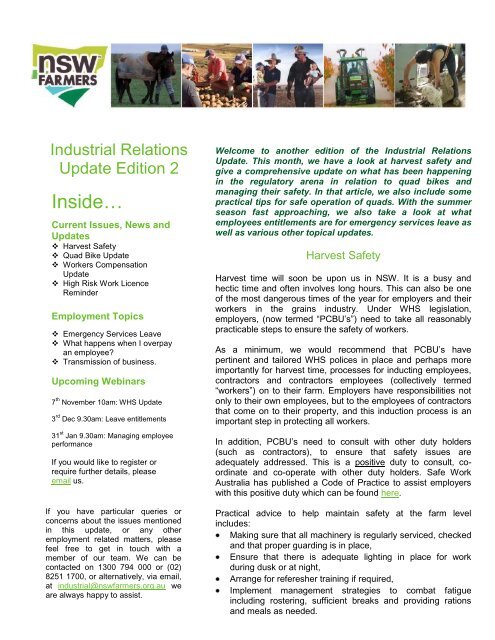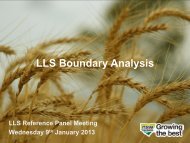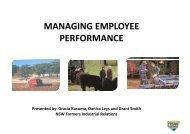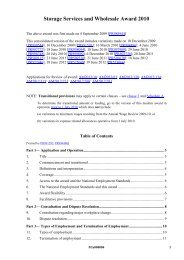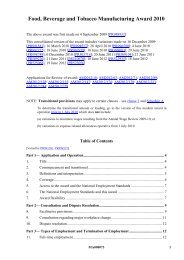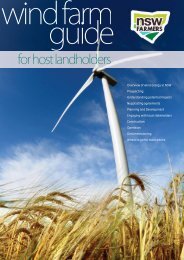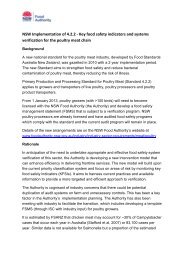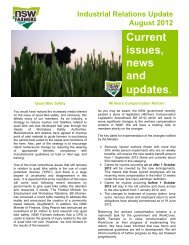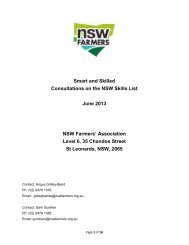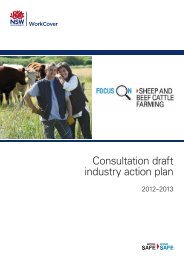Inside… - NSW Farmers Association
Inside… - NSW Farmers Association
Inside… - NSW Farmers Association
Create successful ePaper yourself
Turn your PDF publications into a flip-book with our unique Google optimized e-Paper software.
Industrial Relations<br />
Update Edition 2<br />
<strong>Inside…</strong><br />
Current Issues, News and<br />
Updates<br />
Harvest Safety<br />
Quad Bike Update<br />
Workers Compensation<br />
Update<br />
High Risk Work Licence<br />
Reminder<br />
Employment Topics<br />
Emergency Services Leave<br />
What happens when I overpay<br />
an employee?<br />
Transmission of business.<br />
Upcoming Webinars<br />
7 th November 10am: WHS Update<br />
3 rd Dec 9.30am: Leave entitlements<br />
31 st Jan 9.30am: Managing employee<br />
performance<br />
If you would like to register or<br />
require further details, please<br />
email us.<br />
If you have particular queries or<br />
concerns about the issues mentioned<br />
in this update, or any other<br />
employment related matters, please<br />
feel free to get in touch with a<br />
member of our team. We can be<br />
contacted on 1300 794 000 or (02)<br />
8251 1700, or alternatively, via email,<br />
at industrial@nswfarmers.org.au we<br />
are always happy to assist.<br />
Welcome to another edition of the Industrial Relations<br />
Update. This month, we have a look at harvest safety and<br />
give a comprehensive update on what has been happening<br />
in the regulatory arena in relation to quad bikes and<br />
managing their safety. In that article, we also include some<br />
practical tips for safe operation of quads. With the summer<br />
season fast approaching, we also take a look at what<br />
employees entitlements are for emergency services leave as<br />
well as various other topical updates.<br />
Harvest Safety<br />
Harvest time will soon be upon us in <strong>NSW</strong>. It is a busy and<br />
hectic time and often involves long hours. This can also be one<br />
of the most dangerous times of the year for employers and their<br />
workers in the grains industry. Under WHS legislation,<br />
employers, (now termed “PCBU’s”) need to take all reasonably<br />
practicable steps to ensure the safety of workers.<br />
As a minimum, we would recommend that PCBU’s have<br />
pertinent and tailored WHS polices in place and perhaps more<br />
importantly for harvest time, processes for inducting employees,<br />
contractors and contractors employees (collectively termed<br />
“workers”) on to their farm. Employers have responsibilities not<br />
only to their own employees, but to the employees of contractors<br />
that come on to their property, and this induction process is an<br />
important step in protecting all workers.<br />
In addition, PCBU’s need to consult with other duty holders<br />
(such as contractors), to ensure that safety issues are<br />
adequately addressed. This is a positive duty to consult, coordinate<br />
and co-operate with other duty holders. Safe Work<br />
Australia has published a Code of Practice to assist employers<br />
with this positive duty which can be found here.<br />
Practical advice to help maintain safety at the farm level<br />
includes:<br />
Making sure that all machinery is regularly serviced, checked<br />
and that proper guarding is in place,<br />
Ensure that there is adequate lighting in place for work<br />
during dusk or at night,<br />
Arrange for referesher training if required,<br />
Implement management strategies to combat fatigue<br />
including rostering, sufficient breaks and providing rations<br />
and meals as needed.
Current<br />
issues,<br />
news and<br />
updates<br />
We have been busy keeping members abreast of what is<br />
happening in the regulatory space in relation to quad bikes.<br />
Recently, Gracia Kusuma, IR Manager, attended a Quad<br />
Bike Safety Forum in Melbourne hosted by Bill Shorten, the<br />
Federal Minister of Employment and Workplace Relations.<br />
The Forum followed an Issues Paper released by the<br />
Minister seeking feedback on how quad bikes can be<br />
engineered to be safer. Although the purpose of the Forum<br />
was meant to further discuss the submissions received,<br />
discussions held at the Forum quickly narrowed to the long<br />
standing debate on fitment of Crush Protection Devices<br />
(CPDs) on quad bikes.<br />
Subsequent to the Forum, the Minister has announced that<br />
he will be looking at mandating the fitting of CPDs on all<br />
quad bikes used within the ComCare system (federal<br />
government employees).<br />
Several safety interest groups and the unions are calling for<br />
mandatory fitment of CPDs. The manufacturers steadfastly<br />
oppose fitment of CPDs on quad bikes, relying on<br />
research, testing and studies that conclude fitment of CPDs<br />
increases injury risks. The accuracy and reliability of these<br />
studies has been challenged time and time again. Most<br />
recently, a publication released by the Institute for Safety,<br />
Compensation and Recovery Research at Monash<br />
University identifies serious issues with the simulation<br />
methods, and the conclusions of the research relied by the<br />
manufacturers group.<br />
<strong>NSW</strong> <strong>Farmers</strong> supports the retro-fitment of CPDs, but we<br />
cannot support the fitment of CPDs being made<br />
compulsory, especially when there is no definitive and<br />
impartial scientific research in existence about CPDs on<br />
quad bikes. <strong>NSW</strong> <strong>Farmers</strong> believes it is an issue that each<br />
farmer should be able to decide for themselves following a<br />
risk assessment.<br />
<strong>NSW</strong> <strong>Farmers</strong> anticipates the research funded by<br />
WorkCover <strong>NSW</strong> (and undertaken by university of New<br />
South Wales) will set safety standards for quad bikes and<br />
clarify the use and limitations of CPDs on quad bikes.<br />
<strong>NSW</strong> Famers is part of a reference group to oversee this<br />
research.<br />
With that in mind, we thought it was a good time to remind<br />
our members of the recommended best practice when it<br />
comes to protecting your own, your families, and workers<br />
Quad Bike Update<br />
safety whilst operating a quad bike. It is every<br />
employer’s duty to provide safe systems of work and to<br />
maintain a safe work environment. The following<br />
guidelines may help operators when developing safe<br />
systems of work for their operation. This list is not<br />
exhaustive, and different factors will need to be taken<br />
into account on different properties, however, this is a<br />
good start.<br />
Ensure that all individuals that operate a quad bike<br />
know how to do so competently, and have adequate<br />
induction, instruction and training;<br />
Passengers should never be carried on a quad<br />
unless you are operating a quad that is specifically<br />
designed for this purpose;<br />
Ensure that quads are not overloaded, and that they<br />
are fit for the particular task that is being<br />
undertaken.<br />
Define areas of the farm and tracks that are safe for<br />
quad bikes to go, and also spell out where the “nogo”<br />
areas are;<br />
Set safe speed limits that are communicated,<br />
understood and adhered to by all staff;<br />
Restrict the operation of adult quads to competent<br />
persons over 16 years of age;<br />
Always wear a helmet; and<br />
If you are contemplating purchasing a quad bike for<br />
farm use, it is important that the vehicle selected<br />
should fit the type of farm & tasks intended. There<br />
may be another type of vehicle that is more suitable.<br />
WorkCover <strong>NSW</strong> has published a checklist that may<br />
assist in this decision process here.<br />
These tips are taken out of the Australian Centre for<br />
Agricultural Health and Safety practical management<br />
guide for quad bikes and side by side vehicles, this<br />
document is a very comprehensive and useful guide for<br />
producers to consider. You can access it by registering<br />
on their website and browsing their publications.
Employment law<br />
reminders...<br />
helping you to<br />
remain compliant<br />
This month: Emergency Services Leave<br />
What’s the<br />
difference<br />
between IR<br />
Basics and IR<br />
Essentials<br />
membership?<br />
All <strong>NSW</strong> <strong>Farmers</strong><br />
producer members<br />
have an IR Basics<br />
(IRB) membership.<br />
This gives them<br />
access to phone<br />
support (4 x per year)<br />
and limited access to<br />
the IR website.<br />
For an additional fee,<br />
members can upgrade<br />
to the IR Essentials<br />
(IRE) membership<br />
option giving them<br />
unlimited access to the<br />
support services<br />
provided by the IR<br />
team, including<br />
assistance with<br />
drafting all forms of<br />
employment<br />
documentation such<br />
as contracts, policies<br />
and Individual<br />
Flexibility Agreements<br />
(IFA’s).<br />
With the summer season just around the corner, it is important for employers to be<br />
aware of the leave available for employees who volunteer in emergency services<br />
activities.<br />
Employers need to be aware of the entitlements of employees whilst on emergency<br />
services leave, and also, to then ensure that employees are not unfairly victimised as<br />
a result of taking such leave.<br />
In <strong>NSW</strong>, the State Emergency & Rescue Management Act 1989 mandates that<br />
employees cannot be dismissed as a result of taking emergency services leave. Also,<br />
employers cannot alter the circumstances of the employee’s position to their prejudice<br />
or injure the employee’s prospects for promotion in the workplace as a result of them<br />
taking leave.<br />
Emergency services leave is part of the wider entitlement to Community Services<br />
Leave. Under the National Employment Standards (NES), which came into effect on<br />
1 January 2010, employees, including casual employees, have an entitlement to<br />
community service leave. Community Service Leave is available for employees that<br />
are engaged in jury service or in a ‘voluntary emergency management activity’. A<br />
‘voluntary emergency management activity’ means that the activity deals with an<br />
emergency or natural disaster and the employee engages in the activity on a<br />
voluntary basis. In addition, the employee needs to be a member of a ‘recognised<br />
emergency management body’. Such bodies can include fire-fighting and rescue<br />
bodies.<br />
The amount of leave taken can vary, and there is no maximum limit. Generally<br />
though, community service leave (including emergency services leave) allows<br />
absences if it is reasonable in all the circumstances. The leave can include<br />
reasonable travel time and time taken after the leave to rest from the activity<br />
undertaken.<br />
Community service leave is unpaid, except for leave taken to attend jury duty where<br />
there is a requirement to pay “make-up” pay for permanent employees. The amount to<br />
be paid is the difference between the amount that employee is paid for attending jury<br />
service, and the base wage amount that they would have been entitled to had they<br />
attended work. The NES requires employers to pay make-up pay for up to 10 days,<br />
however, award covered employees may be entitled to make-up pay for a longer<br />
period. You will need to check the relevant award for full details.<br />
The notice and evidence requirements are similar as for personal leave. The<br />
employee has to give reasonable notice of their intention to take community service<br />
leave and the employer may require evidence that proves that the leave was for<br />
community service purposes. Specifically for jury service leave, the employer may<br />
require evidence of the jury pay, in order for you to correctly apply the provisions in<br />
relation to “make-up” pay.<br />
For more information on Community Service Leave, click here.
High Risk Work<br />
Licence Reminder!<br />
Are you one of the thousands of<br />
<strong>NSW</strong> workers who hold a high<br />
risk work licence? If so, take a<br />
good look at your current licence<br />
because changes are coming into<br />
effect that mean you might have<br />
to renew before 31 December<br />
this year.<br />
To meet national standards, a<br />
number of older high risk work<br />
licences will require conversion<br />
and renewal before 31 December<br />
2012. This includes licences<br />
issued before 1996, licences<br />
issued between 1996 and 2004<br />
without an expiry date, and<br />
licences issued with an expiry<br />
date but not renewed within 12<br />
months of expiring.<br />
High risk work -<br />
no photo, no valid<br />
expiry, no<br />
licence…<br />
Click here for further details<br />
including the steps you need to<br />
take to renew your licence.<br />
Workers Compensation<br />
Update<br />
As many members would be aware, the <strong>NSW</strong> Workers<br />
Compensation scheme (“the Scheme”) has undergone a<br />
parliamentary review due to the Scheme’s significant deficit of over<br />
$4 billion. Without reform to the Scheme, employers were faced with<br />
up to 28% increases in premiums. <strong>NSW</strong> <strong>Farmers</strong> and members<br />
(through the online submission builder) made submissions to the<br />
review to oppose any additional cost impost for employers.<br />
Following this, amendments to workers compensation laws, to<br />
reform the Scheme in <strong>NSW</strong>, were passed in June. One of the main<br />
objectives of the reform is to improve injured workers’ return to work<br />
rate, and in the long run, reduce the Scheme’s financial viability.<br />
As a result of the reform, the WorkCover Board has since advised<br />
that the premium target collection rate will remain the same, which is<br />
good news for employers. Workers compensation insurance<br />
premiums are based on a number of factors, including the industry<br />
in which you operate, the amount of your annual wages and the dust<br />
diseases levy. Industry rates and formulas used for calculation of<br />
2012-2013 premiums are in the Insurance Premiums Order as<br />
published in the <strong>NSW</strong> Government Gazette.<br />
Details of the reform are being progressively introduced by<br />
WorkCover based on priority timeline. We have drafted a briefing<br />
note that is available here in order to assist members with the<br />
changes that are happening.<br />
WorkCover compliance activities confirm support approach<br />
WorkCover currently appears to be maintaining a focus on<br />
education, support and assistance for employers to help them to<br />
meet their work, health and safety requirements rather than an<br />
enforcement approach which is encouraging.<br />
As of the middle of October 2012 (87% of the year) enforcement<br />
activity was below the long term rates for the 2003-2011 period.<br />
Infringement notices issued - 41% of long term rate.<br />
Improvement notices issue - 74% of the long term rate.<br />
Our sponsors:
What happens if I overpay<br />
an employee?<br />
Most of the wage enquiries that the IR team get are concerned with<br />
what the minimum amounts are to pay an employee under the<br />
relevant awards. Occasionally though, overpayments can occur,<br />
and sometimes, these may not be a one off error, meaning that the<br />
amount overpaid can add up to a large sum over time. In this<br />
article, we discuss what options are available to you as an<br />
employer when this happens, as well as your rights. It becomes<br />
tricky when you are balancing your rights as an employer, with the<br />
commercial reality of keeping employees happy and productive.<br />
If an overpayment has occurred, and this is clear when compared<br />
with the employment contract, an employer can take steps to try<br />
recover this money. We make reference to the contract here as this<br />
will be an important piece of documentation that sets out exactly<br />
what the employee is to be paid, and will be much easier to rely<br />
upon than a verbal agreement when trying to establish an<br />
overpayment error.<br />
In terms of broaching the subject with the relevant employee, a<br />
one-size-fits-all approach will probably not work, and it will depend<br />
on the relationship that you have with the employee in question as<br />
to the approach taken.<br />
Generally, we suggest you convene a meeting and outline to them<br />
the nature of the overpayment, providing as much supporting<br />
documentation as possible (payslips etc) to support your assertion<br />
that they have been overpaid. An employer then has a number of<br />
options:<br />
1. Do nothing and rectify the payroll error to ensure that the<br />
mistake does not happen again,<br />
2. Seek to recover the money by agreement, through regular<br />
payroll deductions, or<br />
3. Seek to recover the money through legal channels.<br />
If option 2 is chosen, employers should give employees adequate<br />
time to consider their position and to figure out how they would like<br />
to pay the amount in question off. This becomes a negotiation<br />
between the employer and the affected employee, and all parties<br />
should keep the details of the particular payment plan confidential.<br />
It is important to remember that any deduction from an employee’s<br />
wage to rectify an overpayment needs to be authorised by the<br />
employee in writing, an employer cannot simply deduct money from<br />
a wage without this authorisation in place. The IR team can help<br />
with drafting an agreement for this purpose. In addition, some<br />
organisations may consider implementing a policy which sets out<br />
how the organisation will deal with overpayment errors and again,<br />
the IR team can assist with developing a policy like this.<br />
In some instances, the employee may not agree to pay back any<br />
money at all. If this is the case, you may consider taking further<br />
legal action to seek recompense, although such action should not<br />
be entered into lightly, and we would strongly encourage you to<br />
have a discussion with a member of the IR team prior to pursuing<br />
this.<br />
Transmission of business<br />
From time to time, we field queries from members on<br />
what happens to employees entitlements in the event<br />
that they sell their farm. If you have particular<br />
question on this, then we would encourage you to get<br />
in touch with a member of the IR team, as this can be<br />
quite a complicated area. However, the following<br />
commentary gives some good general guidance on<br />
how these entitlements are to be treated.<br />
When is there a transfer of business?<br />
Under section 311 of the Fair Work Act 2009 there is<br />
a transfer of business from an old employer to new<br />
employer if the following requirements are satisfied:<br />
the employment of an employee of the old<br />
employer has been terminated;<br />
within 3 months of the termination of<br />
employment, the employee becomes employed<br />
by the new employer;<br />
the work (transferring work) the employer<br />
performs for the new employer is the same, or<br />
substantially the same, as the work the<br />
employee performed for the old employer; or<br />
there is a connection between the old employer<br />
and the new employer<br />
What happens to employee entitlements upon a<br />
transfer of business?<br />
When a transfer of business occurs, service with the<br />
old employer counts as service with the new<br />
employer, and this is so when the new employer is<br />
an associated entity of the old employer. The issue of<br />
associated entities is an important one.<br />
If the two businesses are not associated entities,<br />
then the new employer can decide not to recognise<br />
the incoming employee’s prior service with the old<br />
employer (for the purpose of annual leave and<br />
redundancy pay), which then places an obligation on<br />
the old employer to pay them out.<br />
If the two businesses are in fact associated entities<br />
the new employer should recognise the entitlements<br />
that the particular employee holds, and then in<br />
practice, what usually occurs is that there is an<br />
adjustment on the sale price of the business to take<br />
this into account.<br />
In relation to the employment records, these should<br />
be transferred to the new business, and then the new<br />
employer will need to retain these records in line with<br />
the usual record keeping obligations under the Fair<br />
Work Act 2009.


